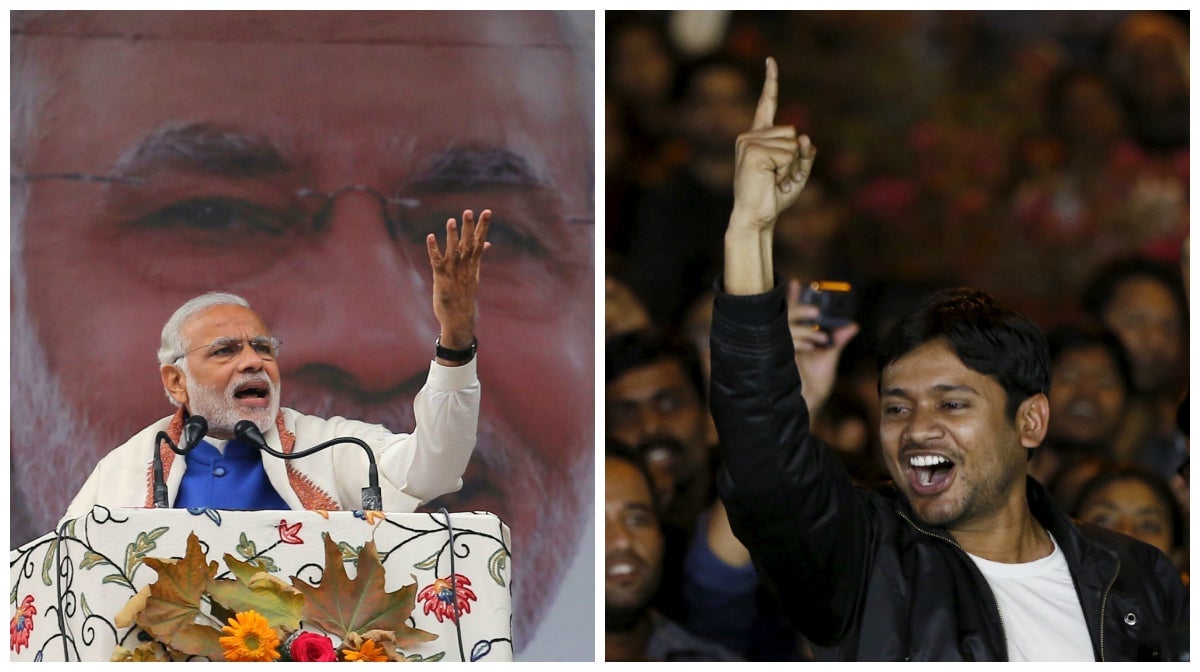A tale of two speeches: Why Narendra Modi should take notes from Kanhaiya Kumar
On March 03, it was a tale of two speeches in New Delhi.


On March 03, it was a tale of two speeches in New Delhi.
One came around noon; the other lit up the capital’s midnight darkness. One was by a dyed-in-the-wool proponent of Hindu nationalism; the other was delivered by a Leftist greenhorn. One was rendered on the floor of parliament; the other reverberated across a university campus.
The first speaker was a sexagenarian prime minister of the world’s largest democracy with decades of political and administrative experience behind him. The other, a Phd student of Jawaharlal Nehru University (JNU) in his late 20s.
Yet, stripped of their contents, the speeches by prime minister Narendra Modi and student leader Kanhaiya Kumar had many similarities. Both were acidic, snarky and merciless in tone and tenor.
Only that, after 20-odd days in jail, Kumar’s address to his fellow students at JNU carried a hero’s defiance. And Modi’s, coming at a time when a polarised nation is desperate for reconciliation, sounded like that of a spiteful, short-sighted leader.
Of the one hour, nine minutes and 41 seconds that Modi’s parliamentary speech lasted on Thursday, he spent the first five minutes enunciating some creative and non-partisan ideas for the House. He held forth like a statesman, talking about the need for exclusive days for women parliamentarians and first-timers to speak in the House. Special discussions on sustainable development were also mentioned.
His tone was encouraging, considering that he was comfortably placed to chart a new course, dissipating the current rancour inside and outside parliament. After all, the railway budget and the general budget had given him that much-needed elbow room to steer the focus back to his positive agenda.
But, instead of using the opportunity to press the reset button, Modi spent the next hour and more dismantling that very opportunity.
While he called for an end to mutual sniping between the government and opposition, his actions betrayed his words as he ambushed, hit below the belt, and indulged in snarky oneupmanship. In short, what could potentially have been a statesman’s speech turned into one fit for the next election rally.
In stark contrast, less than 24 hours later, India was celebrating young Kumar as the new star in Indian politics. His expression of empathy for even junior-level policemen who had incarcerated him, besides his political opponents on the campus, showed a certain maturity beyond his age.
In rustic Hindi, with a smattering of words in English, Kumar sought to prick the nationalist jingoism being whipped up across the country that had led him to jail, even as he saluted martyred soldiers and thousands of farmers who have killed themselves over the last decade and more. He vowed to bring about change within the framework of the Indian constitution and slammed those who sought to subvert it.
“I have many differences with the prime minister but I agree with his tweet – Satyameva Jayate. I also say Satyameva Jayate, the truth shall triumph, because it belongs to the country and the constitution,” Kumar said.
Rubbishing charges that he was an anti-national, he said, “Is it wrong to seek independence from the ills plaguing India… We are not seeking independence from India, but independence in India.”
In parliament earlier, the prime minister quoted stalwarts from the opposition to highlight the disservice their constant disruption of the Lok Sabha was doing to the nation. Yet, he shied away from acknowledging his own party’s role in making parliament dysfunctional and publicly justifying it.
“The House is not being allowed to function, not because they are angry with the government, but because they have an inferiority complex,” Modi said.
Modi’s inability to reach out to the opposition, particularly the Congress party, has been questioned in the past. It has even cost his government, with bills covering the goods and services tax and land acquisition—critical to resuscitate the Indian economy—either stuck or simply killed.
It jarred when he mocked opposition leaders on one hand, and sermonised on the other. “There are some people, who do grow up physically, but not mentally,” Modi said one moment. The next moment, it was: “Nobody should be mocked. Make in India is being mocked.”
Modi reverted to his statesmanly best at the end of his speech.
Seeking the opposition’s cooperation on nation-building, he declared that “governments will come and go. People will come and go. But the country of ours will remain.”
Modi was picking up words straight from the closing lines of another parliamentary speech from another era—that of former prime minister Atal Bihari Vajpayee. Perhaps he should also listen closely to the words of Kanhaiya Kumar.
We welcome your comments at [email protected].